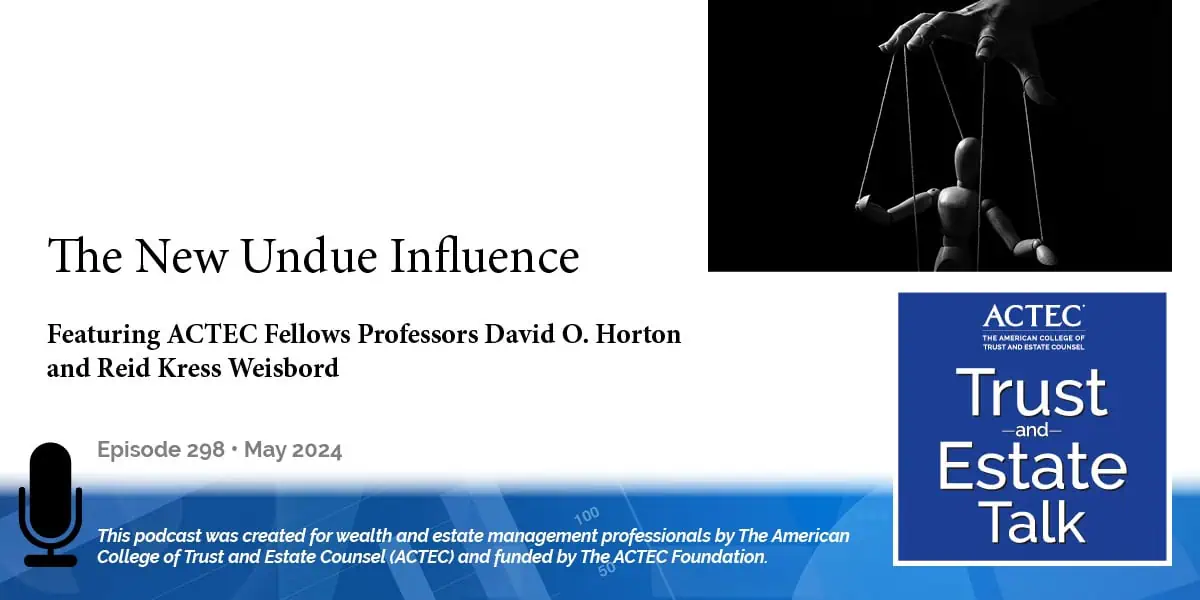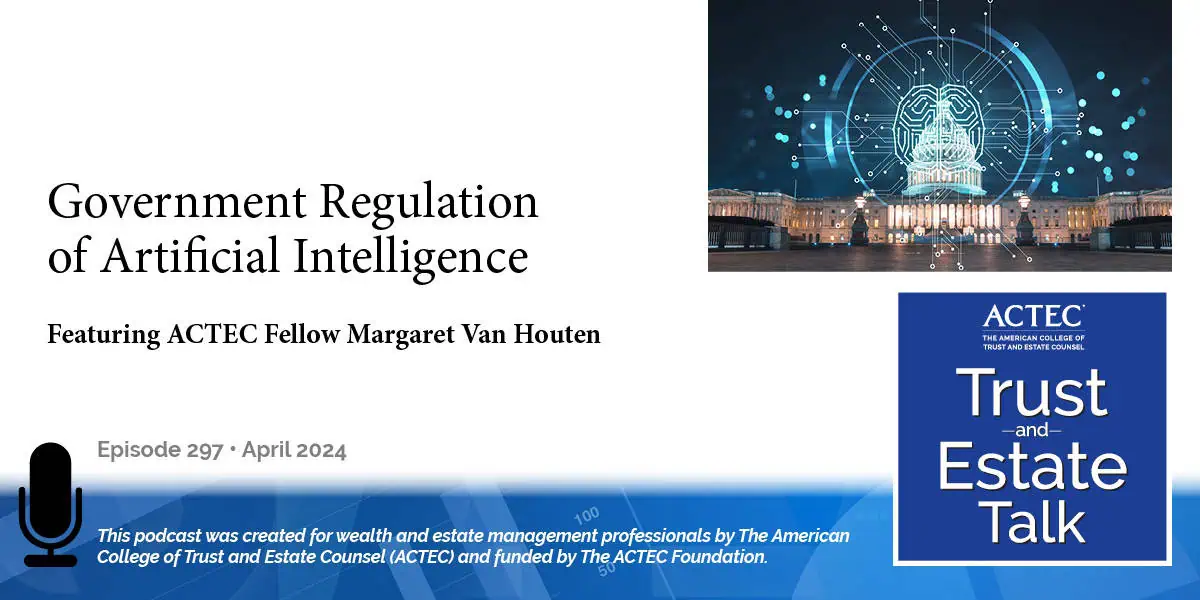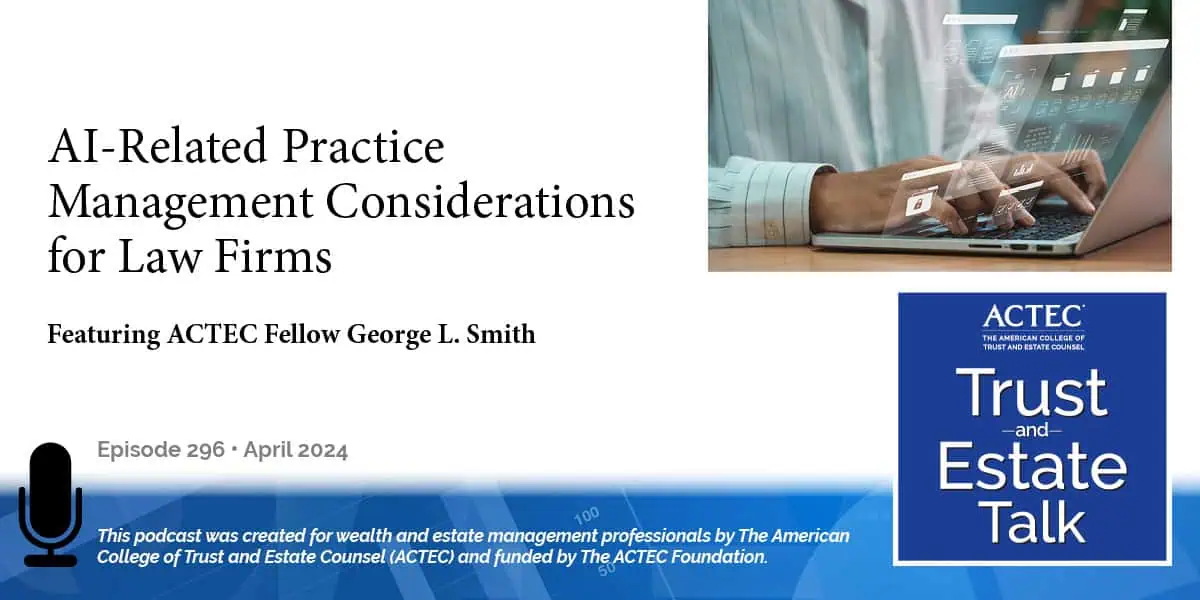Lawyers as Trustees

“Lawyers as Trustees,” that’s the subject of today’s ACTEC Trust and Estate Talk.
Transcript/Show Notes
This is Susan Snyder, ACTEC Fellow from Chicago. As trust and estate planning lawyers, we are often confronted with client requests that benefit the client by reducing the cost of current or future representation, providing first-hand knowledge and efficient execution of his or her intentions by a trusted disinterested advisor, and filling a role for which a client has no other appropriate choice or being the client’s long-term informal general counsel or family lawyer. Because the client’s request could also benefit the attorney, how can the attorney sort through the ethical and legal conflicts and obligations? To address these issues, you’ll be hearing today from ACTEC Fellow, Steven Benefield from Birmingham, Alabama. Welcome, Stephen.
Thank you, Susan, it’s a pleasure to be here today. I’d like to zero in on a topic of particular interest to lawyers who draft wills and trusts for clients. We frequently have clients who come to us who say they have no one else to serve as their executor or the trustee of their trust, and they ask their lawyer to fill that role. And there are many reasons that a lawyer might or might not do that. For instance, the drafting lawyer might be the best person to serve as the trustee in the client’s will or trust because the lawyer knows the terms of the will and trust better, probably, than anyone else, including the client. The lawyer’s legal and ethical training, and knowledge and expertise can provide added value to the client and particularly where you have long-standing relationships with a client, you may be familiar with family dynamics and conflicts and who can be trusted and who can’t be trusted much better than anyone, sometimes any other family member even.
Now, the issue is where you get down to where you normally have an issue and that is money. And when the lawyer is going to get paid for these services, it raises a number of ethical and legal questions that can result in potential liability for lawyers. The issue of what a lawyer gets paid, how much they get paid, and what they do for what they get paid, particularly as the executor under will or the trustee of the trust, has been the subject of a number of written documents over a number of years.
The first, if you go back to 1973, the American Bar Association Section on Real Property, Probate and Trust issued a statement of principles regarding probate practices and expenses that dealt specifically with the issue of lawyers who served as the guardian of a person or is the executor under a will and took a fee not only as the executor or the guardian, but also a fee for serving as the lawyer for the executor or the guardian because those are actually two separate roles. There was some perception that there had been some abuse in that area and so the ABA, the American Bar Association, came out with some written guidance for lawyers on that. In 1992, the same ABA section came out with Principles for Attorneys Acting in Other Fiduciary Roles, and in 1994 that was also published in a special report of that section.
Come along to 2002 and Rule 1.8 of the Model Rules of Professional Conduct, which deal with prohibited transactions for lawyers and specifically with transactions between lawyers and clients and when there is an exception to the absolute bar of those transactions, added comment Number 8 to Rule 1.8 which essentially says that Rule 1.8 doesn’t apply to the situation in which a client and the client’s lawyer, who is drafting a will or trust, ask the lawyer to be the fiduciary under that document. So that’s not considered a “transaction” between lawyer and the client.
Now, understand that the Rules of Professional Conduct, which have been adopted in most states, although not in any state without some changes and with many states a lot of changes; California to the point you might not recognize them and a few other states as well, are only for lawyer disciplinary purposes. These are the rules that the bar association and the courts used to determine whether lawyers keep their license to practice law, whether they will be suspended or disbarred or reprimanded for actions that they take as lawyers. Many of the rules follow and come from the fiduciary duties that apply between a principal and an agent. Attorneys in one sense are nothing more than agents for their clients as principals and as agents we are fiduciaries to our clients. As such, we have fiduciary duties to our clients and in order to fulfill those duties and to help lawyers in part remember them, learn them and keep them sort of at the forefront, many of the Rules of Professional Conduct restate fiduciary duties that lawyers owe to their clients. In some cases, they are actually much more specific than the general fiduciary duties that apply between a principal and agent.
For instance, the Rule on Confidentiality that applies to a lawyer is extremely broad. It applies to any information about the client, including information that is gained from a public source. As lawyers, we don’t talk about our clients to anyone about anything unless it is to pursue the representation. It doesn’t matter that there was an article in the newspaper about our client. We don’t get to talk about it. So, in that sense, the duty of confidentiality is far broader than that of your typical agent in a principal agent relationship or the duty of a trustee in your typical express trust, which is the basis for defining fiduciary duties as we generally understand them, and if you look to the Restatement of the Law of Trusts and read it in conjunction with the Restatement of the Law Governing Lawyers, you will find there’s a great deal of overlap and cross-reference between the two.
So, what do we do about finding ways to do this? States have taken different approaches in whether lawyers can agree to serve as a fiduciary under a document that’s drafted by the lawyer. Some states in the past have taken a very dim view of that. Other states such as California and New York have statutes that expressly permit lawyers to serve as fiduciaries in documents they draft. In some states, such as Georgia, courts have adopted express rules and procedures that need to be followed. And then, under the Model Rules as adopted in most states, we have the rules on Conflicts of Interest in Rule 1.7 and Rule 1.8, coupled with the rules governing communications with the client and the concept of informed consent by the client to the representation and to the additional role that’s being taken on as the fiduciary under the document. And of course, the concept of informed consent requires that a lawyer explain in some detail the potential risk and the advantages, as well as the alternatives to the proposed course of action. So that if the client is going to ask you to be the trustee or executor, then it’s the lawyer’s obligation to explain that there are other ways that can be accomplished; that there are institutions who will serve as fiduciary; that there are family members who might serve as fiduciaries. In some states and other pockets, there are individuals who serve as professional fiduciaries who are not lawyers. And that’s perfectly okay, if they’re willing to take that on.
So, what are some of the things you need to worry about if you are a lawyer who is going to accept the appointment as the executor or trustee? To the extent that some states still have what we used to refer to as the Model Code of Professional Responsibility, there was an ethical consideration that dealt with this issue directly, which simply said that a lawyer should not consciously influence a client to name him or her as the executor or trustee under a document that that lawyer drafts. Now, that rule was criticized as being fairly vague, but I think that criticism might actually have been a bit overblown because one could argue that many of the general fiduciary duties that any fiduciary owes, whether it’s the agent to a principal or the trustee of the express trust, or a lawyer to a client, are going to be vague.
For instance, in Rule 1.7 of the Rules of the “Rules of Professional Conduct,” which are used as the minimum standard for lawyer discipline, 1.7(b) says, you shall not take representation or maintain representation to the extent that there is a significant risk that your representation of someone else or your personal interest might materially limit your representation. Well, just how vague is a significant risk and a material limitation on your representation? Well, it’s kind of like, equity is as long as the Chancellor’s big toe. What is significant to you might not be too significant to me and what is a material limitation might seem insignificant to me. So, there you go. Don’t necessarily throw things out as vague simply because they are broad.
Comment 8 to Rule 1.8 that I mentioned earlier says that, if you are going to be the executor or trustee for your client, then you don’t have to worry about jumping through all of the hoops that come with engaging in a business transaction with your lawyer, and those hoops include encouraging, if not demanding, that your client gets separate legal representation, and taking an objective view to the representation from the client’s perspective as to whether it is reasonable and fair. Well, once again, what’s reasonable is the subject of a great deal of litigation, and as we all know, fair is something that occurs in the fall.
So, if you can figure that out just from the typeface of the rule, you will be in better shape than I am. In any event, the American Bar Association in 2002, shortly before Comment 8 came out for Rule 1.8, issued Formal Opinion 02–246, just three months before the Comment 8 out, and it concluded that not only was it okay for a lawyer to be named as the fiduciary under the will or trust that the lawyer is drafting, but the representations and the disclosures that were required were a good deal less expansive than what some commentators have suggested are required.
For one thing, the concept of informed consent that I mentioned, is about disclosing information to your client and Formal Opinion 02-246 speaks in terms of what is disclosed to the client. Well, Professor Rounds in Loring and Rounds: A Trustee’s Handbook suggests that that doesn’t go quite far enough, because from a malpractice or professional liability standpoint or a fiduciary duty standpoint, which is what governs our relationship with our client, not the Rules of Professional Conduct. The Rules of Professional Conduct govern our relationship with the bar association and the court. The law, the civil law, governs our relationship between our clients and ourselves and that’s what determines whether we end up owing our clients money because we’ve done something to damage their interest and we get sued and it goes to court. Well, we can talk about that in many ways, but the simple fact is, the understanding that the client has to have is the key. It’s not what we tell them, it’s what they understand.
And so if you are going to be the trustee or the executor under a will or trust that you draft for a client, it’s critical that you make sure that client understands and you have done everything in your power to make sure that client understands and that you can prove it. Now, there are other problems with being a trustee for a client, not the least of which is that the Rules of Professional Conduct apply a standard of care that probably sets the standard of care for civil liability and holds lawyers to be professional trustees. And if you want to look at some of the obligations of the professional trustees, then go to the website for the Office of the Comptroller of the Currency and see what the obligations of banks and other lending institutions are, that have trust departments, with respect to serving as trustees. They are professional trustees. And you might say, “well, I’m just a single individual. I am not a bank. I don’t have to be powered by that standard.” Well, let me know how that works out for you. Because as far as I know, the fiduciary duty doesn’t make a distinction between degree. You are either a professional trustee or you’re not. So there’s the caution for the day: if you want to be a trustee or an executor under a document that you are drafting for a client, beware. Be careful what you ask for, because you may get more than you bargained for.
Great. Thanks, Steven. Thanks for helping us through this ethical minefield.
Thank you.
This podcast was produced by The American College of Trust and Estate Counsel, ACTEC. Listeners, including professionals, should under no circumstances rely upon this information as a substitute for their own research or for obtaining specific legal or tax advice from their own counsel. The material in this podcast is for information purposes only and is not intended to and should not be treated as legal advice or tax advice. The views expressed are those of speakers as of the date noted and not necessarily those of ACTEC or any speaker’s employer or firm. The information, opinions, and recommendations presented in this Podcast are for general information only and any reliance on the information provided in this Podcast is done at your own risk. The entire contents and design of this Podcast, are the property of ACTEC, or used by ACTEC with permission, and are protected under U.S. and international copyright and trademark laws. Except as otherwise provided herein, users of this Podcast may save and use information contained in the Podcast only for personal or other non-commercial, educational purposes. No other use, including, without limitation, reproduction, retransmission or editing, of this Podcast may be made without the prior written permission of The American College of Trust and Estate Counsel.
If you have ideas for a future ACTEC Trust & Estate Talk topics, please contact us at ACTECpodcast@ACTEC.org.
Latest ACTEC Trust and Estate Talk Podcasts

The New Undue Influence
Law professors discuss the evolving landscape of undue influence in estate law, analyzing economic dynamics, legislative changes, and empirical findings.

Government Regulation of Artificial Intelligence
Rapid growth of AI demands government regulation to safeguard against misuse of private data. Global efforts are underway to address this critical issue.

AI-Related Practice Management Considerations for Law Firms
A discussion for law firms about how to incorporate AI in their practice management, including staff considerations, the “billable hour,” and more.

